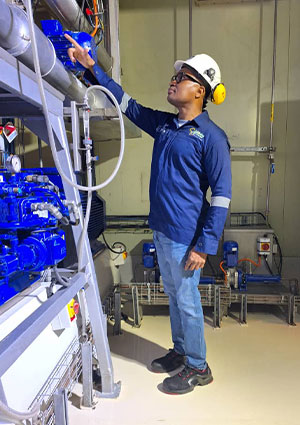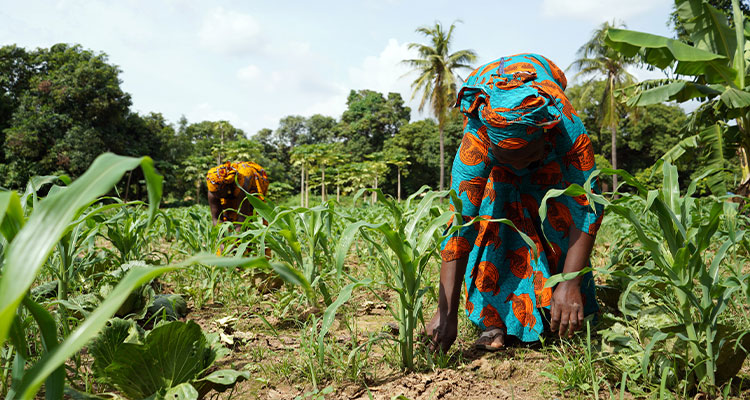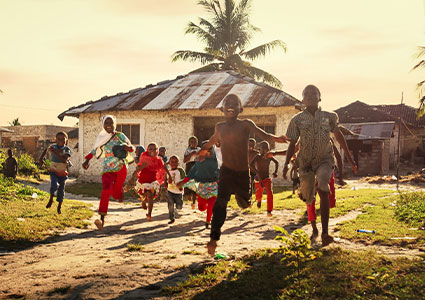Uncover the dedicated mission behind inspirational social entity, Africa Improved Foods
Rooted in Rwanda, Africa Improved Foods (AIF) is an African social enterprise striving to end malnutrition across the continent via scalable and sustainable solutions that nourish families. Through a unique public-private partnership involving DSM, IFC, FMO, and the Government of Rwanda, AIF has been feeding more than 1.5 million children every day since its inception in 2016.

AIF’s mission does not stop there; the organization is growing, with a goal to be the best-in-class provider of safe, nutritious, and affordable food, impacting more than ten million lives across Africa by the end of 2028. Through producing affordable, high quality, and locally sourced foods, AIF is not only providing better and affordable nutrition, but also creating jobs and reducing poverty in the value chain. The mission also positively impacts the sourcing of local raw materials and regional purchasing, bolstering economic development on the continent.
To learn more about the organization and its mission, we sit down with Ramesh Moochikal, CEO, and Daniel Nyange, COO of Rwanda. “AIF was established in 2016 in response to a call for ‘Africa to feed Africa’, and through our unique partnership approach to tackling malnutrition, we can extend our reach throughout the value chain,” Ramesh opens. “We’re a mission-based organization with a vision to be an impact-driven African food champion that addresses hunger and malnutrition through resilient and sustainable food systems.
“Our area of specialty is the production of fortified blended foods, made up of composite flour with added vitamins and minerals. Our fortified porridges are an accessible and affordable solution for addressing malnutrition in humanitarian aid efforts, for instance. These products are used by the Government of Rwanda and humanitarian organizations to prevent stunting, ensure healthy growth and development, and support immune system development.
“With more than 1.5 million meals distributed every day, around 85 percent of our relief is dedicated to three target categories: infants and young children, pregnant and breastfeeding mothers, and general family,” Ramesh states. “However, our commitment extends beyond nutritional excellence. We want to deliver more than just food; we want to deliver hope and resilience to communities across Africa.”
Daniel continues: “Rwanda is the first of four intended countries that AIF’s geographical expansion envisages; our 2024-to-2028 roadmap firmly places the Rwanda operation as a solid platform from which to implement our regional growth strategy. The investment in Rwanda for both capital expenditure and working capital is $65 million for 64 kilotons, but we’re striving to grow this capacity to 85 kilotons by 2028.
“We’re also aiming to have the Rwanda operation fully certified on ISO45001 for occupational health and safety and ISO14001 for environmental management by 2028, as well as achieve an optimal equipment effectiveness (OEE) of 90 percent. We also hope to lower our total downtime from 16 percent to ten percent, and ensure the site’s carbon footprint meets stakeholder expectations, with Scope 1, 2, and 3 emissions actively mapped, managed, and reported.”
A noble mission 
Reflecting on the company’s mission, Daniel says: “The concept that Africa should be fed by Africans is very exciting, particularly as the Africa Continental Free Trade Area (ACFTA) is taking root, which will facilitate our mission by enabling easier access to materials and markets. With an ambitious target to correct malnutrition in the ‘first 1000 days’, AIF is ideally positioned to reduce malnutrition rates, which will improve productivity and reduce healthcare costs for future generations.
“Monitoring reports show that from 2017 to 2021, stunting reduced from 47 percent to 35 percent and the number of underweight children reduced from 13 percent to nine percent. In terms of health conditions, anemia reduced from 35 percent to nine percent; iron deficiency from 34 percent to 22 percent; and vitamin A deficiency from seven percent to four percent. If this is not a noble mission, what is?
“AIF has also positively impacted regional grain supply with our model to pick maize from farmers earlier and on cob before the kernels are stressed by challenging post-harvest handling. This strategy reduces mycotoxin, especially the dreaded aflatoxin development. AIF also provides mechanical threshers and drying facilities in several hubs. We currently work with around 90,000 small holder farmers in Rwanda and the surrounding areas, with 45 percent of those being women.
“As an impact investor, our work rests in three of the UN’s Sustainable Development Goals (SDGs). In line with SDG 1, to end poverty, we’re working with the Ministry of Health to reduce malnutrition rates, and in line with SDG 2, to end hunger, we’re striving for food security and improved nutrition nationwide. Lastly, as a joint venture with the Government of Rwanda, DSM, FMO, and IFC, our organization is in line with SDG 17, to strengthen the means of implementation and revitalize the global partnership for sustainable development.”
With a dedicated mission at its core, AIF will continue to feed vulnerable populations across Africa, particularly with the expansion plans already underway. “The first half of 2024 was impacted by current global macroeconomic challenges, which resulted in low demand for finished products,” Daniel explains. “However, we effectively used this time to take care of our critical manufacturing assets, upskill staff, and engage with additional stakeholders to sharpen our systems. Beyond this year, our ambition is to grow AIF’s impact footprint from feeding 1.5 million people currently, to more than ten million people.
“We’ve also completed the conceptual, basic engineering, and the project execution plan for a project in Ethiopia in readiness for kick-off,” he concludes. “Rwanda is a center of excellence in manufacturing operations, and it would be great to see more African countries copying the model outlined by the Ministry of Health in Rwanda to feed vulnerable populations.”

